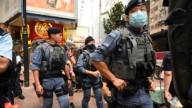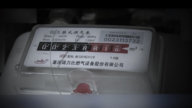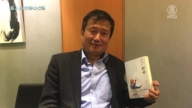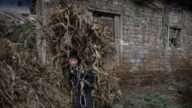【新唐人2013年03月02日讯】十八届二中全会最近落幕,也为即将召开的“两会”定下了人事安排,这也代表中共十八大的权力交接临近尾声。香港媒体透露,这次的人事布局牵涉面广、层级高,当局是“以稳为主”来组建执政团队。接下来,请看报导。
刚刚闭幕的十八届二中全会,敲定了中共新一届国家机构和政协机构的人事安排,剩下的只是等待在全国人大和全国政协会议上对名单表决。
不过,外媒都在预测结果。台湾《中国时报》报导说,届时习近平将当选国家主席,李克强任总理,张德江任委员长,俞正声任政协主席,张高丽则担任常务副总理,没有悬念。
而台湾《联合报》认为,在中共政治局委员层面,李源潮料将成为排名第一的副委员长,执掌人大日常工作;刘延东可能成为政协第一副主席,主持政协日常工作。其他现任中央政治局委员,汪洋、马凯、王沪甯、李建国等,也都会身居要职。
另外,外界更为关注、变动较大的国务院内阁换届:像外交部、国家发改委、财政部、监察部、央行、铁道部以及卫生部等,由于部长升职或年龄原因都可能换人。
香港《明报》透露,北京高层对于这次“组阁”非常慎重,人事决策以“求稳”为主。
美国“中国社会民主党”主持人刘因全:“他们要搞国务院的人事调整,要搞一个大部制,就是进行一些部委的合并,搞成一个大部,这可能是一个看点;第二,我想他们会修改宪法的一些相关的内容;再就是,强调严格按照宪法办事,这个会成为一个看点。”
美国“中国社会民主党”主持人刘因全认为,中共还可能为了他们在海外的名声和形象,增加台湾、香港和海外人士成为政协委员,以引导对中共有利的舆论。
法国《欧洲时报》3月1号的评论指出,中国大陆国务院机构改革无疑是中共一系列改革中的重要一环,也是中共执政以来的第13次国务院机构大调整。这次与以往不同的是,当下中国利益多元化的格局已经形成,由于既得利益格局的掣肘,新一轮改革举步维艰。因此,这次大部制改革也是对中共新领导集体的一次考验。
而新加坡《联合早报》则指称,外界所传的一些机构撤并,如成立大文化部、大金融监管机构、大环保部等“大动作”改革,未必能很快兑现。特别是对于长期以来自成体系、政企不分的铁道部改革,更不会一步到位。
在2008年“大部制”改革时,时任铁道部长刘志军就曾大力阻止。
美国中文杂志《北京之春》主编胡平指出,目前中共内部没有政治强人,人事决策“求稳”是必然的。所以,更多时候他们内部组成一个小圈子,由各个派系讨价还价来分赃人选。
政论家胡平:“因为现在他们最担心一条,就是:它们中共体制内部发生比较大的分裂。所以它把是不是和中央保持一致这事看的更重。最近王岐山讲话也谈到,绝不允许公开发表和党的决定不相同的看法,都表明这一点。”
胡平认为,这种条件挑出的新一届官员,都是与上面关系好、听话的人。所以,中共以后的决策恐怕与“江、胡时代”差不多,还会把维稳放在最重要的第一位。
就在两会之前,大陆一些维权人士已经受到打压:目前身在四川的莫之许,被劝告两会后再回北京;胡佳到父母家过元宵节,国保追到他父母家;北京的丁家喜律师会被警察全天候陪护到两会结束;而被非法限制在家的维权人士许志永,已经被警察从北京家中带走;成都维权人士陈云飞现在也已经被人看守。
由此看来,习近平在此之前宣称的“宪政梦”,也只是一句忽悠话。
采访/李韵 编辑/宋风 后制/周天
18th Party Congress Ends, Stability is Main Theme.
The second meeting of 18th Party Congress recently ended.
It has settled the personnel arrangement for the “Two Sessions”.
This towards to the end of power transfer in National
People’s Congress (NPC) and the National People’s Political Consultative Congress (NPPCC).
According to reports from Hong Kong media,
the personnel arrangements involve officials from a broad spectrum of levels.
The management team has been organized
based on stability. So, let’s look at the report.
The second meeting of 18th Party Congress recently ended.
During the meeting, decisions were made on
personnel arrangements for the NPC and NPPCC.
What is still to be revealed is the
list of names for the Two Sessions.
However, overseas media are making predictions.
Taiwan’s “China Times” reports that Xi Jinping
will be elected Chairman at the meeting.
The Premier will be Li Keqiang, with
Zhang Dejiang as President of NPC,
and Yu Zhengsheng is Chairman of NPPCC.
Zhang Gaoli will serve as Deputy Prime Minister.
These are very predictable.
Taiwan’s “United Daily News" says that at the Politburo
Commissioner level, Li Yuanchao will be Deputy President
of NPC, and overseas normal functioning of the NPC.
It is likely that Liu Yandong will be Deputy Chairman
of CPPCC and overseas normal functioning of CPPCC.
Other Politburo members, such as Wang Yang,Ma Kai,
Wang Huning and Li Jianguo will hold important positions.
However, observers are more concerned about
the state council, which will change more.
This includes the Ministry of Foreign Affairs, the National
Development and Reform Commission, Ministry of Finance,
Ministry of Supervision; the central bank, the
Railways Ministry and the Ministry of Health.
Because the ministers of these departments have been
promoted or are aging, these personnel will be changed.
Hong Kong’s Ming Pao Daily News, said that Beijing’s
top leaders were very cautious for the cabinet.
Personnel decisions were made
based on maintaining stability.
Liu Yinquan, President of “Chinese Social Democratic Party”:
“The CCP wants to adjust personnel arrangements of the
state council and organize large departmental systems.
That means merging some departments into one department.
Secondly, I think the CCP will modify
some content in the Constitution.
Thirdly, it will place emphasis on abiding
by the Constitution, which will be a focus.”
Liu Yinquan thinks that the CCP will give some NPPCC
positions to people from Taiwan and Hong Kong.
The purpose is to maintain their reputation.
On March 1, French European Times commented
that the reform of China’s state council would be
the most important among a series of CCP reforms.
That is the 13th reform after the CCP took power. What
differs from before are the patterns of wealth in China.
Because it is limited by officials vested interests,
new shifts in reform will be very difficult.
So, the large departmental reform will
test the new leadership of the CCP.
Singapore’s “Lianhe Zaobao" highlights that some of the
rumors about closing and merging some departments,
such as founding a large Culture Ministry, as well as large
financial regulation and environmental departments.
These reforms may not happen straight away.
Especially for independent, government enterprises,
or reforms of Railways Ministry, which won’t be seen soon.
When large departments reformed in 2008, the minister
of the Railways Ministry made large efforts to stop it.
Editor of Chinese American magazine “Beijing Spring",
Hu Ping, points out that there is no political strongman
within the inner CCP, so it’s normal that the personnel
decisions are done to try to create stability.
So, more time, they will found a small group to spoil
the position by different sects.
Hu Ping: “What the CCP is worried about are
splits developing within the core CCP leadership.
So they focus more on consistency
within the Party Central committee.
Recently, Wang Qishan has also mentioned that it
absolutely forbidden to voice a different view from the CCP.”
Hu Ping thinks that according to this requirement,
Newly appointed officials must have a good relationships
with their leaders, and abide with the leaders’ orders.
So, later on, the political decisions may be little different
from the era of Jiang Zemin and Hu Jintao.
Maintaining stability is placed as top priority.
Before the “Two Sessions”, some civil
rights activists have been suppressed.
Mo Zhixu is now in Sichuan Province, and he was warned
not to go back to Beijing until the Two Sessions have ended.
When Hu Jia went to his parents home
during the Lantern festival, security staff followed him to his parents home.
Beijing attorney Ding Jiaxi will be accompanied
by police until the Two Sessions end.
Civil rights activist Xu Zhiyong, who has been detained
at home, has now been taken from home in Beijing.
Chen Yunfei, a civil rights activist in
Chengdu, has also been monitored.
So, we can say that the “Constitutional Dream"
Xi Jinping declared before are deceptive words.



























